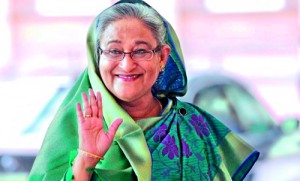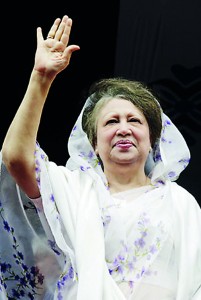Sunday Times 2
Bangladesh leaders’ enmity stokes concern over Jan. vote
DHAKA, Bangladesh – The two ladies, as they are often known, had not spoken in years when aides arranged a telephone call recently in hopes of resolving the mounting political crisis in Bangladesh. The caller was Sheikh Hasina, the prime minister. The recipient was Begum Khaleda Zia, the leader of the political opposition.
“I called you around noon – you didn’t pick up,” began Ms. Hasina, leader of the governing Awami League, according to a transcript published in The Dhaka Tribune, an English-language newspaper.
“This is not correct,” said Ms. Zia, leader of the Bangladesh Nationalist Party.
“I want to inform you that –” the prime minister resumed.

A tense phone call between Prime Minister Sheikh Hasina and Opposition leader Begum Khaleda Zia,(below) has heightened concerns about turmoil in Bangladesh (AFP)
“You have to listen to me first,” snapped Ms. Zia, herself a former prime minister. “You said you called me, but I didn’t get any call around the time you mentioned.”
And so it went, in an acrimonious conversation that titillated Bangladeshi political circles but did nothing to resolve a crisis that is now bringing bloodshed and daily street violence across the country. The poisonous rivalry between the two leaders has created a dangerous impasse, eliciting growing international concern, as both women engage in a bitter game to become the next prime minister.
The issue is whether the two can agree on how the coming elections will be conducted. For nearly two years, Ms. Zia and other opposition leaders have demanded that Ms. Hasina and her government step down shortly before the parliamentary elections so that an impartial caretaker government can oversee the polling – as Bangladesh has done on several occasions. If not, Ms. Zia says her party will not participate in the elections.
But Ms. Hasina has refused, arguing that Bangladesh’s institutions are stable enough to conduct elections and that she is merely abiding by the national Constitution. That is where things now stand, with neither leader willing to budge, even as the damage to the country rises.
“Common sense decrees that the two ladies should work out a compromise,” said a senior Bangladeshi diplomat and longtime political observer, who spoke on the condition of anonymity for fear of angering either of the two leaders. “At the moment, the country is paying a big price in law and order.”
When Bangladesh’s chief election commissioner last week fixed Jan. 5 as the date for national elections, the response was grimly predictable. Men rushed into the streets to set cars on fire, and soon the wailing horns of police cruisers and fire trucks blared through the darkened capital. Since Nov. 26, at least two dozen people have died across the country as the Bangladesh Nationalist Party has staged nationwide strikes, blocking roads and train trestles, to protest the elections.
Throughout the year, Ms. Zia’s opposition party has pressed its demands through these strikes, known as hartals, which have inflicted growing damage on the national economy. This sort of ritualised protest, leavened with violence, is common in Bangladesh: In 1996, the roles were reversed as Ms. Hasina was in the opposition and Ms. Zia was prime minister. Then it was workers in Ms. Hasina’s party who staged strikes to pressure Ms. Zia to bring in a caretaker government for elections.
Bangladesh’s democracy is already fragile, shadowed by a legacy of military rule, and analysts agree that it is imperative to hold fair, inclusive elections next month. The caretaker government system has been used several times in Bangladesh, including in 1991, when the country was emerging from a long period of military rule. But it was abused in 2007, when the military took control. Ms. Hasina was elected in December 2008, and her party, following a court ruling, abolished the caretaker system three years later, infuriating the opposition.
This week, India, the United States and the United Nations are scheduled to send envoys to Dhaka in the hopes of mediating a solution to the crisis. The United Nations secretary general, Ban Ki-moon, has already tried to personally break the impasse, while the assistant

Ms. Zia's opposition party has pressed its demands through strikes, which have inflicted growing damage on the national economy (AFP)
secretary of state for South and Central Asia affairs, Nisha Desai Biswal, used a visit to Dhaka last week to push for a compromise.
“We think the time is nigh for an urgent dialogue to take place,” Ms. Biswal said at a news conference. “There must be some means for parties to come together and discuss their differences, to discuss their expectations and to find the way forward.”
But the mistrust traces back to Bangladesh’s inception as an independent nation, after a bloody 1971 war of liberation from Pakistan. After the war, Ms. Hasina’s father, Sheikh Mujibur Rahman, became prime minister and president; he was assassinated in 1975, along with Ms. Hasina’s mother and 10-year-old brother. The next president was Ziaur Rahman, a military officer who founded the Bangladesh Nationalist Party. His wife, Ms. Zia, became the party’s leader after her husband was assassinated in 1981.
It is that interwoven history, stained with blood and recriminations, that still hangs over Bangladesh. Throughout the year, a special tribunal convened to prosecute war criminals from the 1971 conflict has inflamed tensions, as verdicts have been handed down against several leaders of Jamaat-e-Islami, the country’s largest Islamic political party.
International groups have criticised the war crimes tribunal for flouting due process, while Jamaat leaders have accused the government of politicizing the process. Jamaat, in turn, has unleashed violent protests and pledged to conduct a nationwide rampage if their convicted leaders are executed. Further stoking the anger, Bangladesh’s High Court in August deregistered Jamaat as a political party, effectively banning it from participating in elections.
It is a potent and toxic political situation that could have worrisome results: If a compromise is not reached on the elections and Ms. Zia refuses to participate, the Awami League is certain to sweep to victory. Far less certain is whether the public will regard the results as legitimate. Much will depend on turnout; if more than half the electorate participates, Ms. Hasina will have more solid footing to claim public support.
But turnout could be far lower, which many analysts say could usher in a period of political instability, as opponents would most likely take to the streets to demand a new round of voting. That raises the possibility that the Bangladeshi military, in the name of national stability, might declare a state of emergency.
In a largely Muslim nation like Bangladesh, religion is a powerful subtext to elections. Ms. Hasina and the Awami League promote a more secular vision for the country, while Ms. Zia has spoken in the past of a need for a government that protects Islam. Bangladesh remains a poor country, but one that has achieved real progress. Health indexes have improved markedly, and income per capita has risen.
But the continuing political violence is damaging the economy and alienating the public. Last week, one person died and several were injured when opposition protesters set fire to a bus. Business leaders are calling for a political compromise, as the violence has shut down factories and other commerce. Leaders in the country’s powerful garment industry say the strikes have caused delays in meeting deadlines and may deter foreign investors.
Yet, in the end, it will all come down to the “two ladies,” and whether they can look past their bitter history and find a way to hold an election on Jan. 5.
Courtesy New York Times


